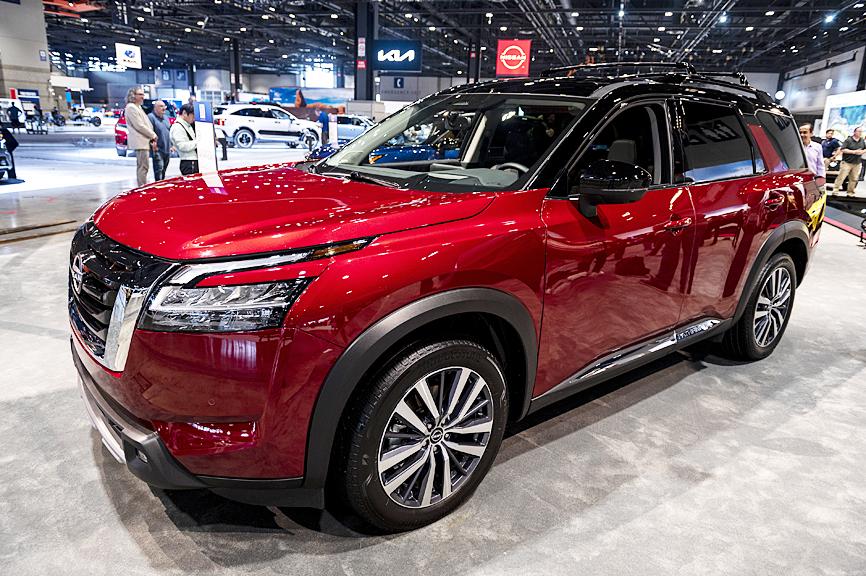Nissan Motor Co on Tuesday said that its factory in Smyrna, Tennessee, would close for two weeks starting on Monday due to chip shortages brought on by a COVID-19 outbreak in Malaysia.
The shutdown is among the longest at any US auto plant of this size since the semiconductor shortage, which has hobbled vehicle production worldwide, started late last year.
Nissan said that it ran short of chips due to a virus outbreak at a chip factory in Malaysia.

Photo: Bloomberg
It expects production to resume on Aug. 30.
The 560,000m2 Tennessee factory employs 6,700 people and makes six Nissan models, including the Rogue small sports utility vehicle (SUV), the company’s top-selling US vehicle.
Analysts said that the temporary closure is a sign that the semiconductor shortage might not be coming to an end late this year as many industry executives had hoped.
Automakers have tried to conserve chips for plants that make their US top sellers, largely SUVs and pickup trucks.
However, pickup truck plants have been shut down sporadically as well, including three General Motors Co factories this week.
Sam Abuelsamid, an analyst at Guidehouse Research Principal, said that the Smyrna plant is crucial for Nissan, adding that the shutdown is a sign that the end of the semiconductor shortage might not be in sight.
“It’s looking like it’s going to stretch at least into the new year,” he said.
With continuing COVID-19 outbreaks across the semiconductor supply chain in Asia and other regions, supply problems might last even longer than that, Abuelsamid said.
The chip shortage is starting to improve, but the Delta variant of SARS-CoV-2 is starting to cause problems at factories in the semiconductor supply chain, making matters worse, IHS Markit senior principal analyst Phil Amsrud said.
Large chip foundries in Taiwan and elsewhere in Asia take large silicon wafers and turn them into multiple smaller integrated circuits. They are then shipped to “back- end” manufacturers in Malaysia, where they are cut into chips that are used in automotive control computers.
However, outbreaks among workers in those factories, and in the shipping business, are affecting supplies again, as evidenced by the Nissan shutdown, Amsrud said.
Also, chips that automakers are getting now might not be the right ones for products they want to build in the future, he said.
In addition, many countries that do the back-end work like Malaysia have low COVID-19 vaccination rates, Amsrud said.
“It looks to me like we’re just set up for Delta getting a foothold in all of these locations,” he said. “I think Delta is going to still cause us all sorts of problems.”

Taiwan Semiconductor Manufacturing Co (TSMC, 台積電) founder Morris Chang (張忠謀) yesterday said that Intel Corp would find itself in the same predicament as it did four years ago if its board does not come up with a core business strategy. Chang made the remarks in response to reporters’ questions about the ailing US chipmaker, once an archrival of TSMC, during a news conference in Taipei for the launch of the second volume of his autobiography. Intel unexpectedly announced the immediate retirement of former chief executive officer Pat Gelsinger last week, ending his nearly four-year tenure and ending his attempts to revive the

WORLD DOMINATION: TSMC’s lead over second-placed Samsung has grown as the latter faces increased Chinese competition and the end of clients’ product life cycles Taiwan Semiconductor Manufacturing Co (TSMC, 台積電) retained the No. 1 title in the global pure-play wafer foundry business in the third quarter of this year, seeing its market share growing to 64.9 percent to leave South Korea’s Samsung Electronics Co, the No. 2 supplier, further behind, Taipei-based TrendForce Corp (集邦科技) said in a report. TSMC posted US$23.53 billion in sales in the July-September period, up 13.0 percent from a quarter earlier, which boosted its market share to 64.9 percent, up from 62.3 percent in the second quarter, the report issued on Monday last week showed. TSMC benefited from the debut of flagship

A former ASML Holding NV employee is facing a lawsuit in the Netherlands over suspected theft of trade secrets, Dutch public broadcaster NOS said, in the latest breach of the maker of advanced chip-manufacturing equipment. The 43-year-old Russian engineer, who is suspected of stealing documents such as microchip manuals from ASML, is expected to appear at a court in Rotterdam today, NOS reported on Friday. He is accused of multiple violations of the sanctions legislation and has been given a 20-year entry ban by the Dutch government, the report said. The Dutch company makes machines needed to produce high-end chips that power

As South Korea descends into political chaos, its equity market risks falling further behind major tech rival Taiwan, which is basking in the glory of a global artificial intelligence (AI) boom. A near-30 percent surge in Taiwan’s stock benchmark this year, set to be the best since 2009, has already helped spur a historic divergence between Asia’s two tech-dominated markets. The nation’s market capitalization now exceeds South Korea’s by about US$950 billion as the world’s AI frontrunners from Nvidia Corp and Microsoft Corp to OpenAI all increasingly turn to Taiwanese firms for supply. Looking ahead to next year, while both export-oriented economies